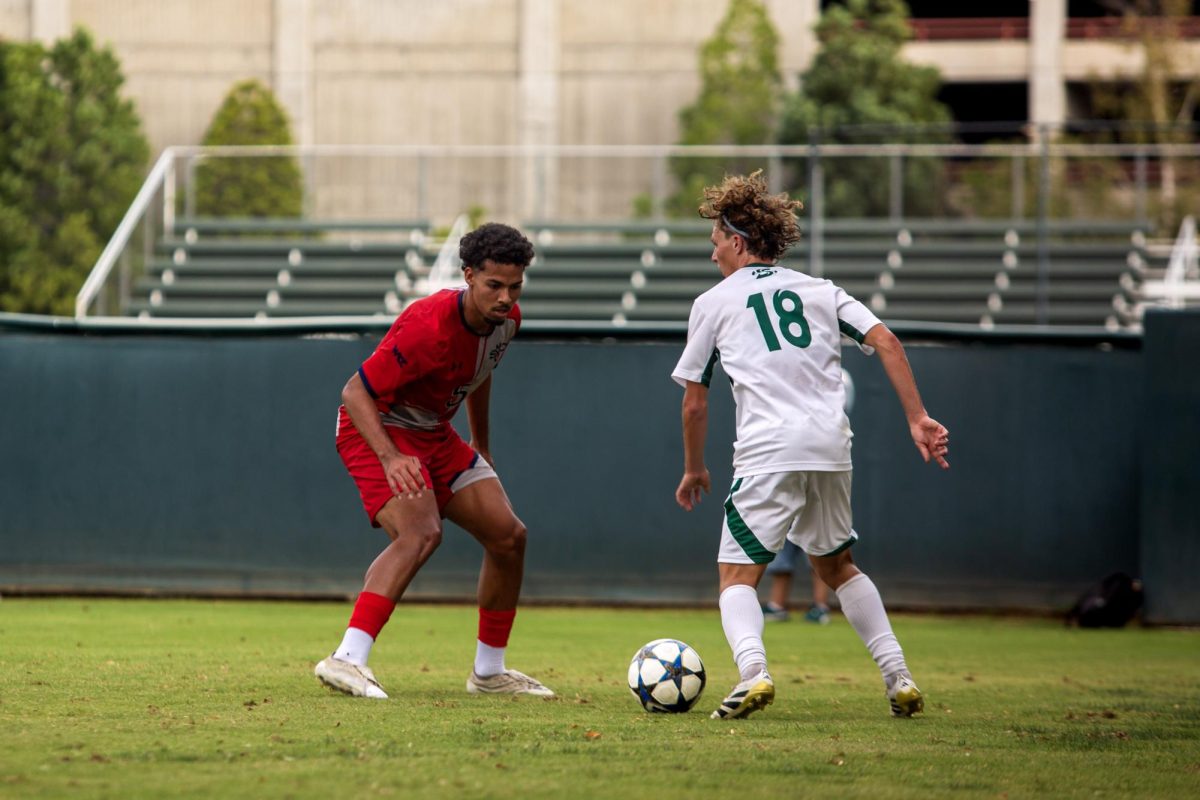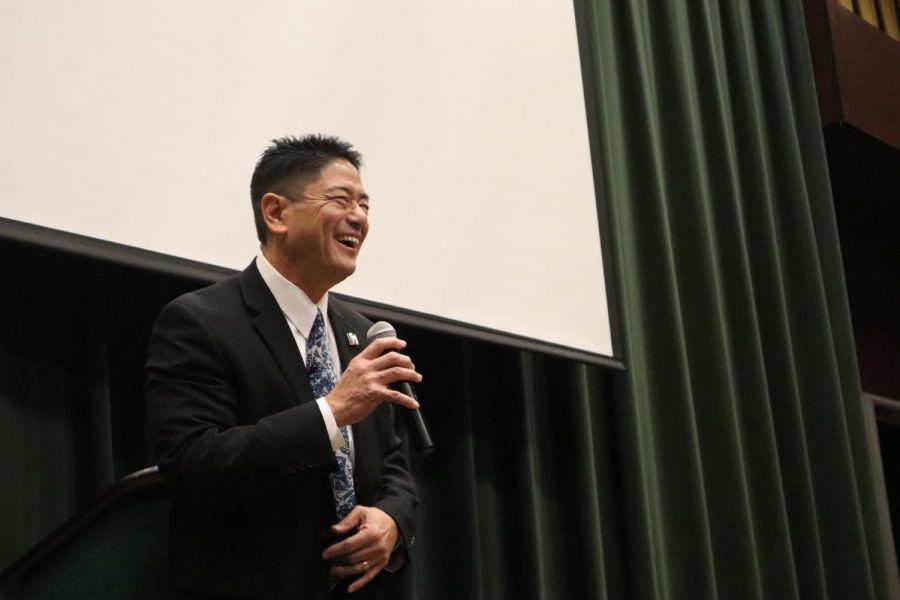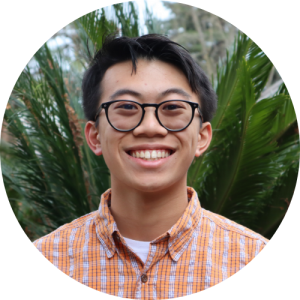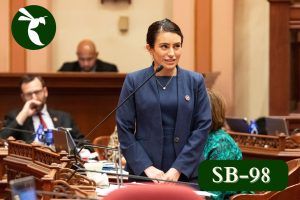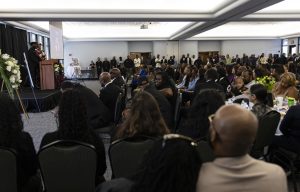University Library celebrates 25th anniversary of Japanese American Archival Collection
Guest speakers call for civil rights activism, Japanese American history knowledge
Taking the stage, Mitchell Maki addresses the crowd after being introduced by Sac State assistant sociology professor Susan Nakaoka Thursday. Maki was Susan Nakaoka’s professor and acted as advisor to her master’s thesis, which studied female second-generation Japanese American activists.
October 4, 2019
The Sacramento State University Library celebrated the 25th anniversary of receiving the first donation of the Japanese American Archival Collection Thursday in the Union.
The event’s main guest speakers were civil rights attorney Mia Yamamoto and Mitchell Maki, executive director for the Go For Broke Foundation. Congresswoman Doris Matsui also spoke.
The Japanese American Archival Collection was created in 1994 and documents the forced placement of Japanese Americans in concentration camps after the Pearl Harbor naval base in Honolulu, Hawaii, was attacked during World War II.
Mary Tsukamoto, a Sacramento teacher and civil rights activist, along with the Sacramento Veterans of Foreign Wars Nisei Post and the Florin Japanese American Citizens League, made the first donations to the archive. They gave various photographs, documents, artifacts and records, according to the University Library’s website.
“I think through this collection, and our voices, we can ensure future generations that we can stop this,” Matsui said. “But we have to also remember and remind.”
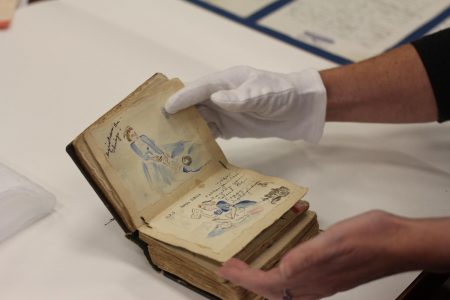
Library services specialist Lynn Drennan flips through Nancy Nishioka’s memory book at The Donald & Beverly Gerth Special Collections & University Archives on Wednesday. The diary contains watercolor sketches and signatures of people close to Nishioka at the Tule Lake Relocation Center, according to the library’s description of the diary.
Students can view the collection online, but James Fox, head of Special Collections & University Archives, recommends students see the collection in person.
“There’s nothing like holding an original diary written by an 8-year-old girl at the camp,” Fox said. “You could see it online, you can see the text, but you can get your whole body involved, just like kinesthetic learning. When you touch something like that, when you smell something like that, it’s a much richer, and deeper experience.”
Electronic records archivist Julie Thomas said that after 9/11, Japanese Americans feared that Muslim Americans would become targets.
“They said, ‘get ready, it’s coming,’ and we see today more and more of the rhetoric, the racism, the hatred towards Muslim Americans,” Thomas said.
Counseling graduate student Tranh Pham said that she came to listen to Yamamoto’s ideas on race and gender, which she thought would be helpful as a counseling student.
“I’m a first-generation Vietnamese American, and I have lived in a refugee camp myself,” Pham said. “I understand what it’s like to find community and belonging in America.”
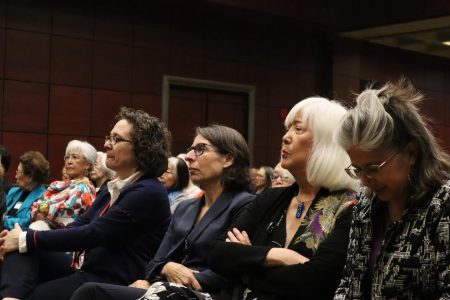
Mia Yamamoto, third from left, waits as Josh Kaizuka, Co-president for the Florin chapter of the Japanese American Citizens League, introduces her Thursday. Yamamoto’s ideas on race and gender in America were the primary draw for students attending.
Yamamoto said in her speech “Intersection of Race & Gender Identity” that minority communities like women, Muslims, Japanese Americans and LGBTQ individuals all benefited from the civil rights movement, even if the movement was not directly aimed at them. For this reason, she called on the audience to support Black Lives Matter.
“We have to be part of the civil rights movement. We have to be part of the struggle for black liberation because that is still unfinished business,” Yamamoto said. “We know it’s evil. We lived through it. Our community had to endure this suffering, and other communities should not have to live through this.”
Yamamoto also shared her experience coming out as transgender. She became Los Angeles County’s first openly transgender attorney in 2003, according to Sac State’s description of the event.
Story continues below tweet.
“I know you hired a guy,” Yamamoto said, recalling coming out to her clients. She came out as transgender in 2003. @TheStateHornet pic.twitter.com/ilqNzATVib
— Chris Wong (@ChrisWongWrites) October 4, 2019
Maki’s speech, “Restoring America’s Promise,” centered around the steps from internment in World War II to the U.S. paying reparations to Japanese Americans in 1988 when a group of Japanese American legislators passed a bill to form a commission to research what caused the creation of concentration camps.
Story continues below tweet.
Maki asked the audience to pretend to be Japanese Americans in the 70s. He asked if reparations should be paid individually or to the entire community. This was a dilemma the community had to face. @TheStateHornet pic.twitter.com/4u1eyhIzir
— Chris Wong (@ChrisWongWrites) October 4, 2019
The committee found that “wartime hysteria, race prejudice and a failure of political leadership” motivated the creation of concentration camps, according to Maki.
“When does that sound like?” Maki asked the audience. “I submit to you that it sounds like today.”
He said that though safety is important, civil liberties should be prioritized.
“Because of your race or your identity that you want to be, you’re basically born in a prison,” said Judy Lim, a teaching credential student. “For some of the students I work with, that’s what they’re going to be judged upon, unfortunately, in the public.”
Lim said this applies especially to Black male students.
UC Riverside graduate Grant Nakaoka is the son of Susan Nakaoka, the master of ceremonies for Maki’s speech and Sac State Assistant Professor. In an interview with The State Hornet, he stressed the need to still discuss slavery, the United States stealing land from Native Americans, the labor abuse that occurred during construction on the Transcontinental Railroad and concentration camps.
“Being indigenous American and Japanese American, it’s part of my racial background, my racial history and identity,” Nakaoka said. “If we can’t acknowledge my identity, I feel almost erased.”
























































